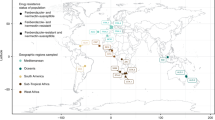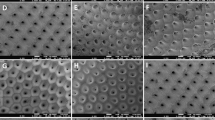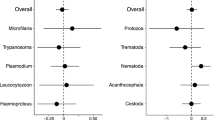Abstract
RECENT observations by Roberts, Turner and McKevett1 have indicated that the so-called ovine and bovine ‘strains’ of Haemonchus contortus (Rud. 1803) are distinct species. This conclusion is based mainly on differences in the morphology of the infective larvæ and in the type of cuticular vulval process dominant in adult females in natural populations in each host. Supporting evidence was also found in heritability tests involving these differences. The measurements of the infective larvæ presented by these authors, however, show some overlapping, and their heritability observations were carried only to the F 1 generation. For these reasons a cytological examination was undertaken and studies of the chromosomes were made on aceto-orcein squashes of the gonads.
This is a preview of subscription content, access via your institution
Access options
Subscribe to this journal
Receive 51 print issues and online access
$199.00 per year
only $3.90 per issue
Buy this article
- Purchase on Springer Link
- Instant access to full article PDF
Prices may be subject to local taxes which are calculated during checkout
Similar content being viewed by others
References
Roberts, F. H. S., Turner, H. N., and McKevett, M., Aust. J. Zool. (in the press).
Author information
Authors and Affiliations
Rights and permissions
About this article
Cite this article
BREMNER, K. Cytological Polymorphism in the Nematode Haemonchus contortus (Rudolphi 1803) Cobb 1898. Nature 174, 704–705 (1954). https://doi.org/10.1038/174704b0
Issue Date:
DOI: https://doi.org/10.1038/174704b0
This article is cited by
-
On the taxonomic analysis of the genus Haemonchus Cobb, 1898
Systematic Parasitology (1981)
-
Revision of the genus Haemonchus Cobb, 1898 (Nematoda: Trichostrongylidae)
Systematic Parasitology (1979)
Comments
By submitting a comment you agree to abide by our Terms and Community Guidelines. If you find something abusive or that does not comply with our terms or guidelines please flag it as inappropriate.



